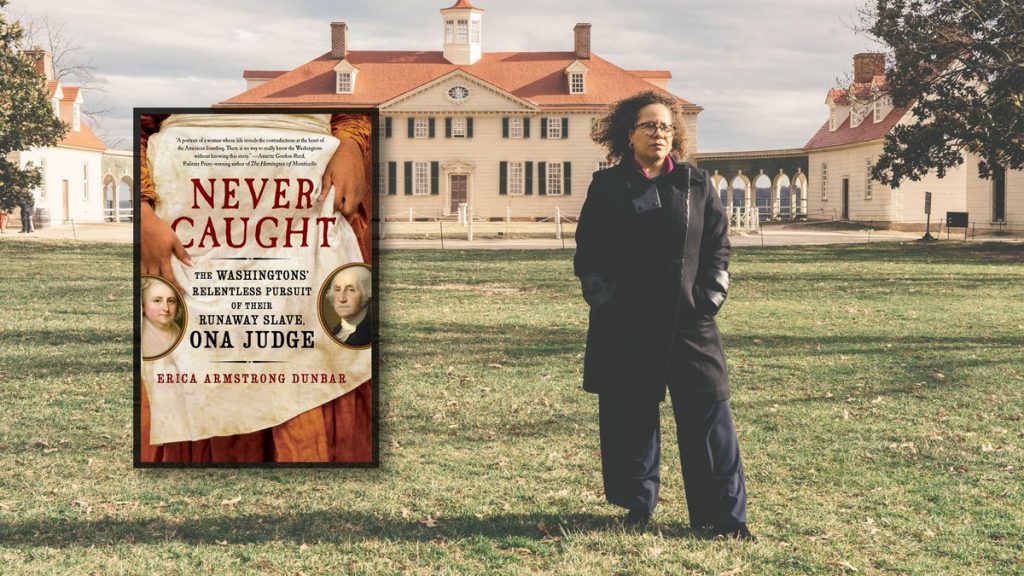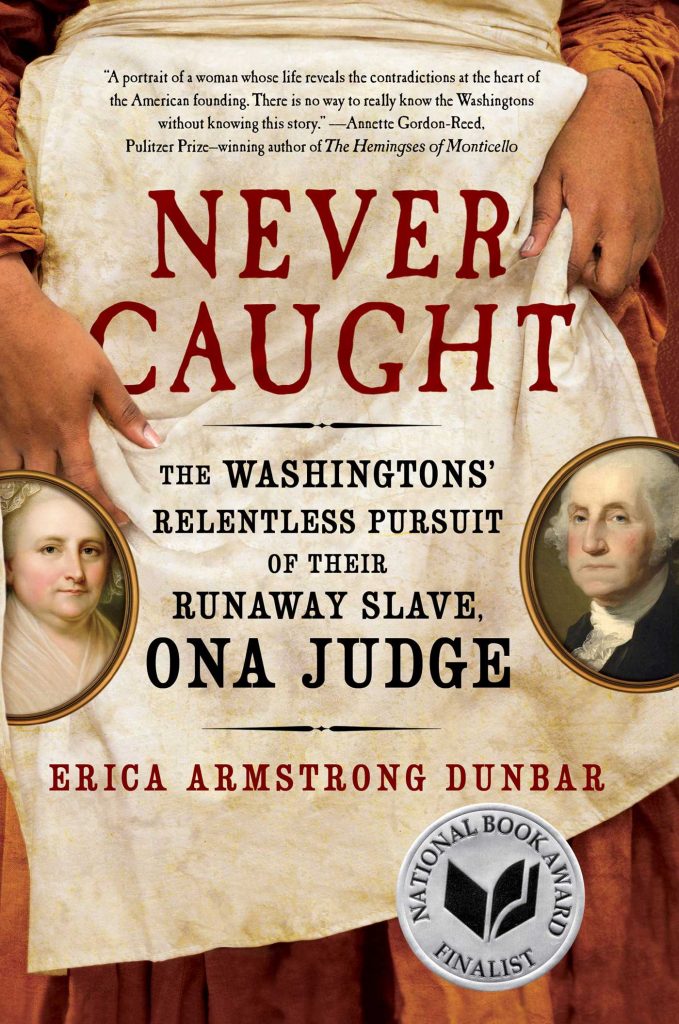*We continue our conversation with writer, historian, and lecturer Erica Armstrong Dunbar; author of the acclaimed “Never Caught: The Washingtons’ Relentless Pursuit of Their Runaway Slave, Ona Judge.” As we previously noted, the book is still a hot item among avid readers and there’s even talk of a possible film adaptation.
Part one of our discussion explored the accolades, sales, craftsmanship and themes of “Never Caught.” We dive deeper into this “runaway” success for the second half of our Q&A with the literary artist.
Get into it below.
OTHER NEWS YOU MIGHT HAVE MISSED: EUR EXCLUSIVE: ‘Never Caught’ Author Erica Armstrong Dunbar Dishes On Book’s ‘Runaway’ Success
EURweb: Now, one thing that you talk about in the book and really put forth, again, is the complex moral question of slavery – that obviously, different people wrestled with and dealt with at different times, in different places, in different ways. Because it seems, especially in the past, I don’t know, forty years? There seems to be something that’s taken hold where a lot of historians and people on the Left, try to emphasize, “It was economic! They didn’t really care about the slaves! It was all economic! There was no morality! It was an economic issue!” How would you talk about that, to try and show the different degrees of the moral question? That people today are still grappling with?
Erica Armstrong Dunbar: Yeah. I think that, actually, (with some of) the stories over the past couple of years, there’s been tremendous work on, kind of, all areas connected to slavery. (For example), slave labor was clearly the linchpin to the national economy, Southern or Northern. The cotton was not being grown in Massachusetts or New York, but the banking institutions that gave mortgages and loans to slaveholders throughout the expanding South – and then Southwest – well, they’re complicit in the institution of slavery. If you were a Northern insurance agency, that allowed the bodies of enslaved people as property – insurable property – for Southern slaveholders, you’re part of the national institution of slavery.
So, we know that. It isn’t a secret, about slavery being a part of the Southern economy. We also know it clearly infiltrated the national economy (and) the North as well.
We know that different religions, that many questioned slavery – specifically groups like Quakers and certain abolitionist groups later on in the 19th century. (These groups) understood that slavery was just wrong and barbaric – and that it was a cancer in American society that needed to be eradicated. Clearly, that was not (felt) by all and eventually would only end by an extremely bloody war.
I think what we see in “Never Caught” is how all of these different thoughts and misgivings about slavery – those who were committed to it (and) those who were committed to fight it – that all of these people are living together and working out from the very beginning of the founding of the nation. This was not an issue that popped up overnight, in 1860, right before a Civil War.
This was something that was a problem – an issue – that plagued the nation from the moment it was founded.
EURweb: Okay. Now, you touched on this a little earlier. But if you just want to sum up out of all the subjects as a historian that you could write about, what made Ona Judge’s story rise to the top of your pile?
Erica Armstrong Dunbar: Oh, I think because it was very clear that her story is one that I think is a relatable story to a lot of people. It is a story about courage. It is a story about humanity. It is a story about oppression (and) about beating the odds. Because these things are so palpable throughout “Never Caught”, it allows people from all different walks of life to connect in some way or another – to Ona and to the book “Never Caught”.
So, hopefully that describes one of the reasons why I knew i just had to write this book. Aside from understanding that connect to Ona and the story, it was contribution of telling the story of America – or earlier, of the very beginnings of this nation – through a different lens.
EURweb: Okay.
Erica Armstrong Dunbar: (We are now familiar with the story) of a free man from New York, whose life was taken from him when he was kidnapped and forced to live as a slave in the South for 12 years. How free is free? And I’m trying to show that for every person life was difficult.
It was difficult to find employment and to take care of basic needs. (People) were openly discriminated against. There was no – as long as slavery existed, freedom was shortchanged. I think that’s applicable no matter where you were. in an urban setting. In a rural setting. In the South. In the North. Everyone was affected in this new nation – and the only state that would come to the new nation later on, Vermont, which did not have slavery in it’s state Constitution.
But slavery had existed pretty much everywhere in the new nation, and one of the things “Never Caught” tries to do is to show us the complexity behind the word freedom. What does it mean to be a free person? What did it mean for Martha Washington, as a woman? Was she truly free? The moment she got married to George Washington, he became the manager of her wealth and her estate. He made the decisions.
How free is free? The way that I wrote “Never Caught” was to make people ask that question – and to once again dismantle this myth that the South was slavery and the North was freedom. That’s the way the line was drawn. I’m troubled by that story, that narrative.
Loyal listeners with little ones in their lives – there is now a young readers edition of @ericaadunbar’s “Never Caught, The Story of Ona Judge”! Learn how Erica uncovered the details of Ona’s life in episodes 137 & 212 of #BFWorld#EarlyAmHist #Twitterstorians #KidLit #Podcast pic.twitter.com/O31nkJpxsJ
— Ben Franklin’s World (@BFWorldPodcast) February 2, 2019
EURweb: Okay. Now, there’s so much good stuff here. One of my only complaints is that it’s not longer. (Laughs)
Erica Armstrong Dunbar: (Laughter) Yeah!
EURweb: That’s a good problem, right?
Erica Armstrong Dunbar: Yeah. (Laughter)
EURweb: Now, some people may have wanted more pages detailing Judge’s journey while free. I mean, it takes a while to build up. It’s close to 100 pages before she actually makes the decision. if you take away the endnotes and list of sources, a little less of half the pages talks about her journey itself.
Is there a reason you kept the novel relatively compact?
Erica Armstrong Dunbar: Well, it’s a non-fiction book. A novel is a work of fiction.
Anyway, one of the reasons it’s shorter – it has everything to do with the evidence I had to fill the story space. I didn’t have more evidence about her journey, about her life, because after she left the Washingtons, after she made the decision to escape, she spent the next 50 years as a fugitive.
EURweb: Right.
Erica Armstrong Dunbar: So, she was very careful not to be hunted. I have much more information (from) when she was a slave, because there were documents, letters back and forth between the Washingtons and other people. (There were) newspaper ads. I had much more to go with.
Ultimately, it’s not a novel. It’s non-fiction and I had to stay true to my historian background. For that reason, it was shorter. I WISH there was more!
EURweb:(Laughs)
Erica Armstrong Dunbar: I worked with what I had – and squeezed that dry, to be perfectly honest!
EURweb: You did. You did it in a very wonderful way.
Erica Armstrong Dunbar: Thank you.
EURweb: Now, Philadelphia and Pennsylvania play a huge role in the story, being a (city and state) where slavery was looked down upon and even outlawed – even during Washington’s time. First, what do you attribute that to? Does such a fact make you have a special affinity for Philadelphia?
Erica Armstrong Dunbar: Well, I have a special affinity for Philadelphia because I’m from Philadelphia. I was raised here. So, I’ll put that out there – go Eagles! That’s just who I am and I will always love Philly.
But I do think, growing up, one of the things that was unique about growing up in Philadelphia is that there’s so much history available to everyone. One of the things about Pennsylvania that made it so unique was that it was really the first to move forward with (actually) beginning to end slavery. They had abolition laws that started to end slavery in 1780. So, that makes it unique for that reason.
I think also, the large presence of the Quaker population – that had already dismantled slavery among their society and friends – these were Quakers who held positions of power. Political power. this brought about the close of slavery much faster in a place like Pennsylvania. It started what would become a kind of movement and gradual abolition – ending slavery gradually across the North.
For that, I think, Pennsylvania stands out. Philly, in particular, (stood out) as a kind of beacon of ending slavery, of understanding the evils of slavery. It also had an understanding that economically, it wasn’t an institution that was required in order for the economy to propel itself. So, Pennsylvania – and other Northern states – could loosen itself and dismantle slavery, without a significant financial loss.
But yes, I’m a Philadelphian – and go Eagles!
Excited that in addition to @ericaadunbar (author of Never Caught) presenting next Thursday, 2/7 at 7PM, @JCPSSuper Marty Pollio will be speaking as well. Get tickets at https://t.co/RHXDYDt1et. @JCPSKY @KWCosby @JamesDeVille @corrieshull @drchriscaldwell pic.twitter.com/VYauMiAMtv
— jason crosby (@jasonwcrosby) January 30, 2019
EURweb: (Laughs) Alright. Now, I touched on this earlier. There are people who will see this book and immediately think it’s bashing the Father of our Country, right? How do you emphasize that that is not what it is about?
Erica Armstrong Dunbar: I feel like – This is what I tell them: “Read the book”. Really, just read the book! What I’ve herd from those people is that it’s actually a much more balanced interpretation than they thought they were going to get.
For me, a historian who focuses on African-American women, there’s a perception that this was going to be a takedown of him – and that was not he case at all. I think that it shows a respect of historical tradition to present fact..and to let the public make up their own mind.
But, by using George Washington’s own letters, his own writings, (by) his own hand, it kind of becomes a difficult case to disconnect all of that, when I provide the evidence of George Washington being a slaveholder in his own words.
So, I just tell folks, “Give it a chance. Read it. Give it an opportunity.” Ultimately, everybody has the right to believe and choose. To believe what they want to believe. But what’s required is that we live in a nation that allows everyone an opportunity to speak their truth.
You don’t have to believe it, but we live in a nation that has an amendment that gives all of us the right to express ourselves – and I would hope that no matter what anyone believes, that we all respect the right to tell stories (and) to tell history (and) write articles, that may come from different opinions or different places.
Ultimately, that’s one of the credits of the founding of the nation, that is unique and allows the nation to stand apart from others. That freedom of speech allows them to do this kind of work. Ultimately, I hope that people from all walks of life – and I believe that this is already true, because I’ve met so many people from different cultures and who’ve lived different experiences, who all found a way to connect with the story. Even when they thought that they wouldn’t! Ultimately, I think I would ask people to be open minded as much as they can.
EURweb: I hope so as well. Now, you include sympathetic and brave white and black (people) who helped judge on her journey to freedom. How important do you think it is to point out blacks who risked their well-being and whites who did what they could – including some who opposed their own President’s wishes? Can you compare that to those who seek to divide us now by race?
Erica Armstrong Dunbar: What was the last part of that?
EURweb: First talk about that and then if you could, contrast that with those who try to divide us by race?
Erica Armstrong Dunbar: Ugh. You’re asking about the current stuff Historians hate to bring stuff up to the present. What I was hoping is that, you know, the stories of people in “Never Caught”…Richard Allen, who was religious….Thomas Whipple, who was a customs collector…who are coming from different places and from different racial backgrounds…John Bowle, who was a white sea captain, who had no ties to abolition or ending slavery, but (he) allows Ona passage to evade capture. These are all people who end up helping a woman who was running for her life.
There were others who helped her. I’m certain. She could not name their names, because it would be a federal crime to do so. You know? I think it shows us, as a story, that when people come together, regardless of their backgrounds, that things can happen – that humanity happens!
I would hope that’s the lesson that we could apply to today – and that’s all you’re getting out of me in terms of the 21st Century!
EURweb: That’s good. That’s enough.
Erica Armstrong Dunbar: (Freedom and opportunity make) the lives of oppressed people better, of course, and is helpful. But it also makes the nation better. I think we’ve struggled as a nation to get to that point, where people from all backgrounds have the same kinds of opportunities, and we can all kind of help (those) that don’t have opportunity to have access.
I think that Ona’s story sort of tells us that, aside from her own sheer will and her courage , and her grit, and her sort of amazing tenacity, where she was able to remain detached from the most important man in the United States!
She also had a network of people that made sure that she would stay protected and it sort of reminds us of the importance of community – and I’ll leave it there.
EURweb: Why do you think it was important to include Ona’s sister Philadelphia in the epilogue?
Erica Armstrong Dunbar: Oh, yeah. Yeah. Yeah. I wanted – you know, in so many ways, so many people told me that once Ona was able to escape, that her life was far from easy, right? But I didn’t necessarily want to just tell the story of just one woman’s life – and the difficulty of living as an enslaved person and how isolating it could be.
I thought that including Ona’s sister, Philadelphia, that it would tell the story of another person.
Like, what happens – when Ona runs away – what happens at Mount Vernon while Ona’s gone? because of the people she knew and were connected – they’re still there. So, how does that play out for them? So, I thought it was a really interesting addition, to think about her sister, who in the past was one of the responsibilities that Ona did not want to fulfill.
It shows how much Ona and Philadelphia would do whatever they could to try and find freedom in a very odd way.
They’re both – whether you run away or you’re working and your environment changes and you’re married to someone who eventually helps you to find freedom. But, it makes the point that black people are doing whatever they can, wherever they can, to find freedom.
EURweb: Mm-hm.
Erica Armstrong Dunbar: So, here a family – her sister and brother-in-law – who are finding a way in Virginia and the federal city that would become. That, of course, being Washington, D.C. They’re trying to find a way to freedom too. So, I thought it would be an interesting way to weave the story of another person left behind at Mount Vernon, into this larger narrative about how black people were trying to free themselves and were always doing that, no matter the circumstances. So, that’s why I brought in Philadelphia’s story.
“She starts to walk. Or does she run? Does she look back?,” @ericaadunbar and Kathleen Van Cleve write of a young woman escaping slavery in “Never Caught, the Story of Ona Judge” #slaveryarchive #twitterstorians #womenalsoknowhistory https://t.co/xRp8x4eoep
— Dr. Ana Lucia Araujo (@analuciaraujo_) January 18, 2019
EURweb: It’s kind of cool that she was named Philadelphia, right? That kind of symbolizes something.
Erica Armstrong Dunbar: Well, it does. We actually don’t have evidence as to why she was named Philadelphia – I don’t know. I wish I did. Maybe that will become available (in the future). She was clearly named after a city and a city that must have meant something to someone. She’s often referred to as “Delphi”. But for the story, for the book, it’s actually quite interesting that she has a Northern name – but manages to find freedom in the South!
EURweb: Okay. Now, this is a story that deserves to be – I feel – penetrating the masses someday on the big screen –
Erica Armstrong Dunbar: Yes!
EURweb: Do you have any offers of that type yet? Do you have an idea of how you would WANT a film to be?
Erica Armstrong Dunbar: I have optioned the book for a film, and so..I can’t talk too much about it! What I will say is that the book has been optioned for a film and I believe the film will be made. Once again, it gives the opportunity for Ona’s story and the story about the Founding of the nation to reach an even larger audience. So, I’m hopeful!
EURweb: Would you be able to say whether or not that might be a big screen film or a TV-film?
Erica Armstrong Dunbar: At this point, it looks like big screen.
EURweb: Oh, excellent. That would be awesome.
Erica Armstrong Dunbar: Well you know.We’ll see. When you option (a) book, you option the rights. It’s ultimately the producers who will make that decision. Everything at this point appears as though it will head towards the big screen.
EURweb: That would be incredible. remember the little people!
Erica Armstrong Dunbar: Well, you know, I’m very excited about the opportunity. But I’ll be honest – the book is what is most important to me.
EURweb: Of course.
Erica Armstrong Dunbar: That was a thing that I wrote. The book is a thing that I spent 9 years crafting and writing. A film would be fantastic! But, ultimately as a historian, the book means a whole lot.
However, I’m also someone who really appreciates and values access. I think that by this becoming a film, it just generates additional opportunity for many, many people to know Ona’s story.
EURweb: Right. Well, if you look even at a film like (the new) “Death Wish”, sales of the book went up – and that book was released over 40 years ago!
Erica Armstrong Dunbar: Right.
EURweb: When “A Wrinkle in Time” was released, sales of the book went up.
Erica Armstrong Dunbar: Right.
EURweb: So, the fact that it becomes a film – if nothing else, even if they gut the book and make a lame movie –
Erica Armstrong Dunbar: Right!
EURweb: But people will go into Borders, or order online and find this book and read this book. It’s almost like it would be the best advertisement in the world for the book.
Erica Armstrong Dunbar: Yes! That’s what one hopes. Um, and I know, ultimately I think that Ona…Ona lived as a fugitive for nearly half a century. However, she left these interviews at the end of her life, and I’m fairly certain that she never wanted to be forgotten. So, it’s really just been an honor and an obligation to introduce her to the world. But I hope that readers enjoy her story and learn from it.
EURweb: Whoa. that is awesome. Thank you so much. I really appreciate you taking the time to do this. I especially thank you for taking the time to write this book. Thank you very, very much.
Erica Armstrong Dunbar: Oh, thank you. Thanks so much.
We Publish News 24/7. Don’t Miss A Story. Click HERE to SUBSCRIBE to Our Newsletter Now!






